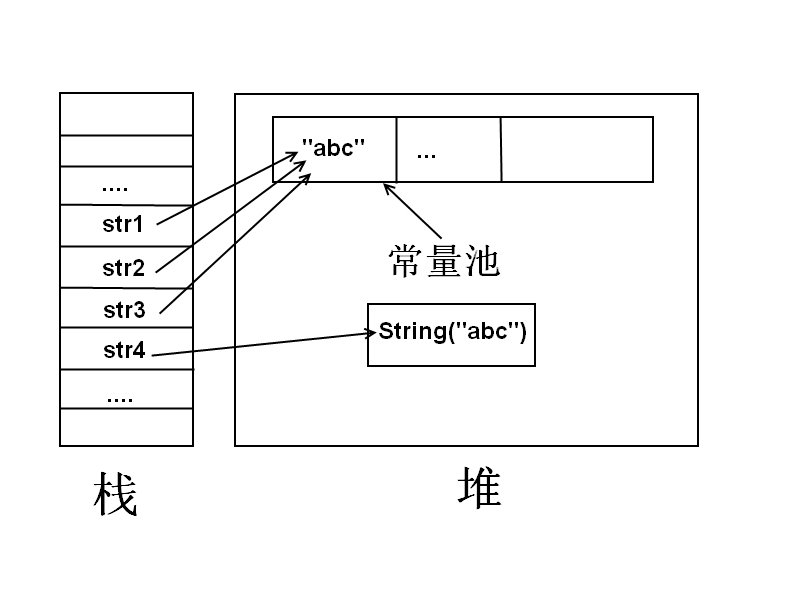文章来源:
http://blog.163.com/woshihezhonghua@126/blog/static/1271436362012101214031911
首先明确一点,String是一个类。
a) String类的对象的两种赋值方式
a) 1 类似普通对象,通过new创建字符串对象。String str = new String("Hello"); 内存图如下图所示,系统会先创建一个匿名对象"Hello"存入堆内存(我们暂且叫它A),然后new关键字会在堆内存中又开辟一块新的空间,然后把"Hello"存进去,并且把地址返回给栈内存中的str, 此时A对象成为了一个垃圾对象,因为它没有被任何栈中的变量指向,会被GC自动回收。
a)2 直接赋值。如String str = "Hello"; 首先会去缓冲池中找有没有一个"Hello"对象,如果没有,则新建一个,并且入池,所以此种赋值有一个好处,下次如果还有String对象也用直接赋值方式定义为“Hello”, 则不需要开辟新的堆空间,而仍然指向这个池中的"Hello"
以下代码可以测试这一结论 ,最后输出结果为 true, 我们用的是== 测试,输出true,说明两者的地址是一样的
a)3 手动入池
即使使用new关键字,第一种方式赋值,也可以使用一个java中的手动入池指令,让所创建的对象入池,以后依然可以背重复使用,利用下面两段代码可以测试, 如下图,结果显然是false,因为二者的地址不同。
下面程序中,我们使用了intern()方法,手动入池,所以结果是true.
public class TestString
{
public static void main(String args[]){
String str1 = new String("Hello").intern();
String str2 = "Hello";
System.out.println( str1==str2 );
}
}
下面程序中,str2没有使用直接赋值,所以结果又变为false
public class TestString
{
public static void main(String args[]){
String str1 = new String("Hello").intern();
String str2 = new String("Hello");
System.out.println( str1==str2 );
}
}
综上所述,开发中,使用直接赋值的方式,显然效率更高。
b) 为什么String类的对象可以直接赋值
打开了String.class,有这么一段介绍:
-
/**
-
* The
String class represents character strings. All
-
* string literals in Java programs, such as
"abc", are
-
* implemented as instances of this class.
-
*
-
* Strings are constant; their values cannot be changed after they
-
* are created. String buffers support mutable strings.
-
* Because String objects are immutable they can be shared. For example:
-
*
-
* String str = "abc";
-
*
-
* is equivalent to:
-
*
-
* char data[] = {'a', 'b', 'c'};
-
* String str = new String(data);
-
*
-
* Here are some more examples of how strings can be used:
-
*
-
* System.out.println("abc");
-
* String cde = "cde";
-
* System.out.println("abc" + cde);
-
* String c = "abc".substring(2,3);
-
* String d = cde.substring(1, 2);
-
*
-
*
-
*/
通过上面的介绍,我们可以清楚,直接赋值的话,是通过编译器在起作用,当你对"abc"没有通过new创建时,他会自动默认给你调用构造函数new String(char value[]). 不显式调用String的构造函数(通过new叫显式调用),其实JDK编译器会自动给你加上。
JDK5+junit4.5写的例子,完全通过测试

import static org.junit.Assert.assertNotSame;
import static org.junit.Assert.assertSame;
import org.junit.Test;
/**
* @author Heis
*
*/
public class StringTest{
@Test
public void testTheSameReference1(){
String str1="abc";
String str2="abc";
String str3="ab"+"c";
String str4=new String(str2);
//str1和str2引用自常量池里的同一个string对象
assertSame(str1,str2);
//str3通过编译优化,与str1引用自同一个对象
assertSame(str1,str3);
//str4因为是在堆中重新分配的另一个对象,所以它的引用与str1不同
assertNotSame(str1,str4);
}
}
阅读(846) | 评论(0) | 转发(0) |
